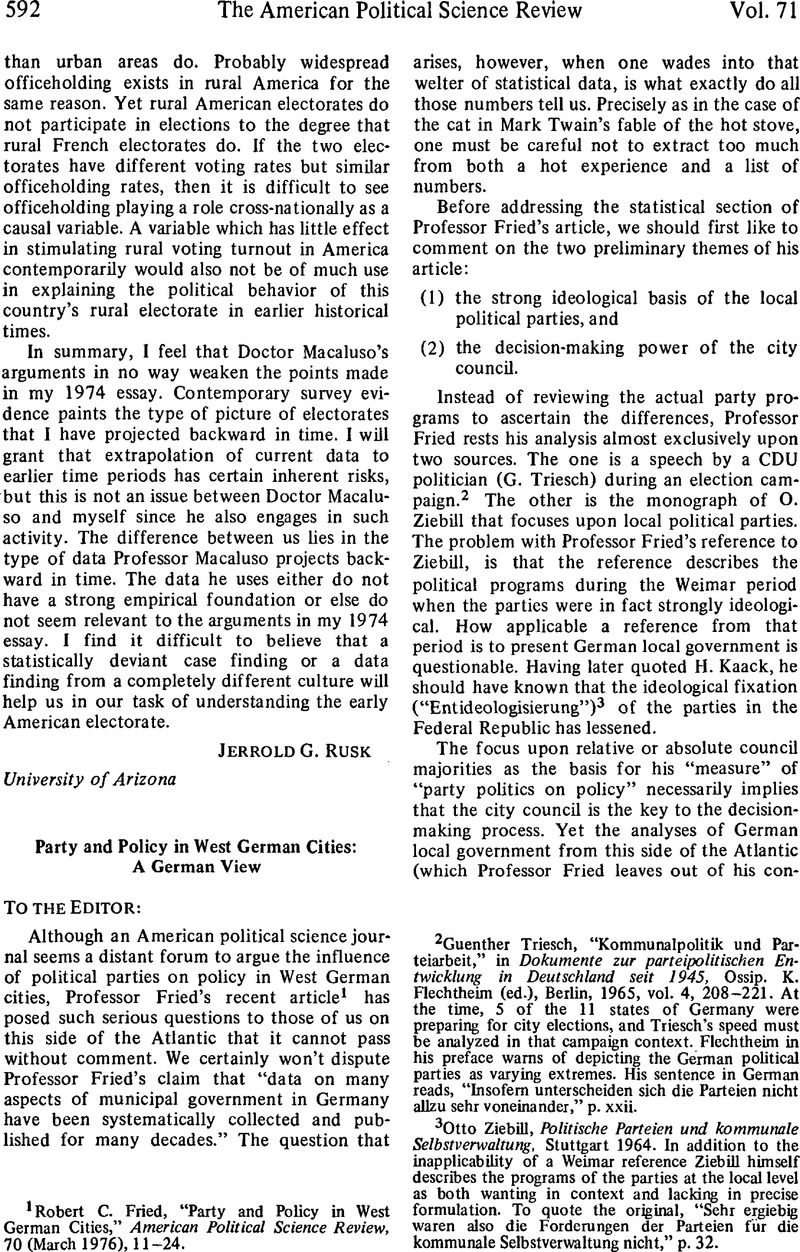No CrossRef data available.
Article contents
Party and Policy in West German Cities: A German View
Published online by Cambridge University Press: 01 August 2014
Abstract

- Type
- Letter
- Information
- Copyright
- Copyright © American Political Science Association 1977
References
page 592 note 1 Fried, Robert C., “Party and Policy in West German Cities,” American Political Science Review, 70 (March 1976), 11–24 CrossRefGoogle Scholar.
page 592 note 2 Triesch, Guenther, “Kommunalpolitik und Parteiaxbeit,” in Dokumente zur parteipolitischen Entwicklung in Deutschland seit 1945, Ossip. Flechtheim, K. (ed.), Berlin, 1965, vol. 4, 208–221. At the time, 5 of the 11 states of Germany were preparing for city elections, and Triesch's speed must be analyzed in that campaign context. Flechtheim in his preface warns of depicting the German political parties as varying extremes. His sentence in German reads, “Insofern unterscheiden sich die Parteien nicht allzu sehr voneinandei,” p. xxiiGoogle Scholar.
page 592 note 3 Ziebill, Otto, Politische Parteien und kommunale Selbstverwaltung, Stuttgart 1964 Google Scholar. In addition to the inapplicability of a Weimar reference Ziebill himself describes the programs of the parties at the local level as both wanting in context and lacking in precise formulation. To quote the original, “Sehr ergiebig waren also die Forderungen der Parteien fur die kommunale Selbstverwaltung nicht,” p. 32.
page 593 note 4 The tendency to avoid political conflicts in the council has been described as “Gesetz der Grossen Koalition.” See Grauhan, R. R., “Der politische Willensbildungsprozess in der Grossstadt,” in “Grossstadt-Politik,” ed. Grauhan, Rolf-Richard, Guetersloh 1972, p. 152 CrossRefGoogle Scholar. Also Zoll, Røflf, “Wertheim III, Kommunalpolitik und Machtstruktur,” Munchen 1974, p. 64f., 74 Google Scholar.
page 593 note 5 In the cited year, 1964, among the 75 largest German cities, only 15 had independent police forces. The other 60 were served entirely by State supported and directed police forces, Statistisches Jahrbuch der Deutschen Gemeinden, 1964, pp. 420–421 Google Scholar. Bavaria and Hesse have local police forces, while Baden-Württemberg allows each community with over 75,000 inhabitants the option of maintaining a local force. See Grauhan, R. R., Politische Verwaltung, Frieburg 1970, pp. 184–185 Google Scholar. It is not astonishing therefore that in his Table 8 the white-collar SPD cities have such an extraordinarily high percentage of police in contrast to the proletarian SPD or CDU cities: five of the six are situated in Bavaria or Hesse.
page 593 note 6 In Cologne, the fourth largest German city, school personnel comprised a mere 3.5 per cent of all city bureaucrats, the smallest group in the city administration. There were more Beamte and Angestellte engaged in street maintenance than in the Cologne schools. Statistisches Jahrbuch Köln, der Stadt, 1964, pp. 165–166 Google Scholar.
page 593 note 7 Welfare payments are regulated through the Bundessozialhilfegestzes (BSHG).
page 593 note 8 The Wohnungsbaugesetz (WoBauG) regulates all public housing in the Federal Republic.
page 594 note 9 The Statistisches Jahrbuch Deutscher Gemeinden (1970) shows the following statistics on the ratio of residents to beds in the selected CDU and SPD cities, p. 142 ff.*
page 594 note 10 Compare Reiff, Friedrich, “Personal der staedtischen Verwaltungen,” in Statistisches Jahrbuch Deutscher Gemeinden, 1964, p. 402 Google Scholar: “Vergleiche koennen nicht allgemein, sondern nut auf individueller Grundlage, d.h. unter Beruecksichtigung der gemeindlichen Struktur und des Aufgabenbereiches angestellt werden. Die Bevoelkerungsgroesse kann niemals alleiniger Massstab fuer ein Urteil sein, ob eine Gemeinde im Stellenplan oder im Personalbestand aufwendig oder sparsam ist.”
page 595 note 11 For works that focus upon the strength of the bureaucracy in decision making, see, among others, Frey, Rainer, “Kommunale Demokiatie und Ratsfraktion,” Die Demokratische Gemeinde, Jg. 27 (1975), pp. 357–362 Google Scholar; Grauhan, Rolf Richard, Politische Verwaltung, Frieburg 1970 Google Scholar; Fuerst, Dietrich, Kommunale Entscheidungsprozesse, Baden-Baden 1975 Google Scholar.



Comments
No Comments have been published for this article.